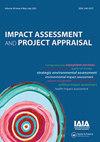Environmental clearance conditions in impact assessment in India: moving beyond greenwash
IF 1.9
4区 社会学
Q3 ENVIRONMENTAL STUDIES
引用次数: 2
Abstract
ABSTRACT This paper examines the EIA process and its effectiveness in addressing the impacts of a 190 km long national highway project along the Karnataka coast. We analyse the quality and relevance of the environmental clearance conditions established by the Ministry of Environment, Forest, and Climate Change (MoEF&CC) and discusses their potential implications. The findings underline that most of the conditions that pertained to the prevention of pollution, restoration of mangroves, and protection of biodiversity lacked a scientific basis and specific information required for effective implementation. The MoEF&CC also overlooked the social impact of the project and underplayed its own role in ensuring fair compensation to project affected communities for the loss of their land and other livelihoods. The paper concludes by promulgating a long list of irrelevant and ineffective environmental conditions that represent greenwashing because it could misguide affected communities and other stakeholders by creating the impression the state is exercising due diligence in protecting the environment.印度影响评估中的环境清理条件:超越“绿灰”
摘要本文考察了环境影响评价过程及其在解决卡纳塔克邦海岸190公里长国家公路项目影响方面的有效性。我们分析了环境、森林和气候变化部(MoEF&C)制定的环境清理条件的质量和相关性,并讨论了其潜在影响。研究结果强调,与防止污染、恢复红树林和保护生物多样性有关的大多数条件都缺乏有效实施所需的科学依据和具体信息。MoEF&C还忽视了该项目的社会影响,并低估了其自身在确保受项目影响的社区因土地和其他生计损失而获得公平补偿方面的作用。该论文最后公布了一长串不相关且无效的环境条件,这些条件代表着“洗绿”,因为这可能会给人留下国家在保护环境方面尽职尽责的印象,从而误导受影响的社区和其他利益相关者。
本文章由计算机程序翻译,如有差异,请以英文原文为准。
求助全文
约1分钟内获得全文
求助全文
来源期刊

Impact Assessment and Project Appraisal
ENVIRONMENTAL STUDIES-
CiteScore
4.60
自引率
22.70%
发文量
52
期刊介绍:
This is the international, peer-reviewed journal of the International Association for Impact Assessment (IAIA). It covers environmental, social, health and other impact assessments, cost-benefit analysis, technology assessment, and other approaches to anticipating and managing impacts. It has readers in universities, government and public agencies, consultancies, NGOs and elsewhere in over 100 countries. It has editorials, main articles, book reviews, and a professional practice section.
 求助内容:
求助内容: 应助结果提醒方式:
应助结果提醒方式:


